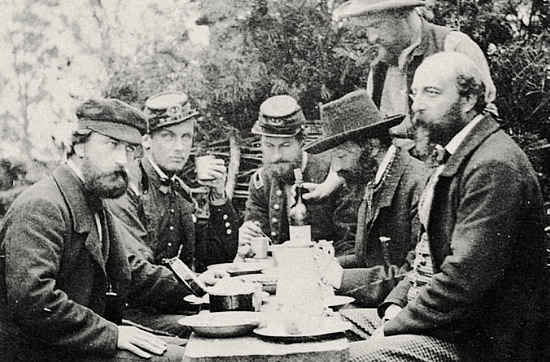Civil War: Confederate Coffee
The double blow of the Union naval blockade and the fall of New Orleans in 1862 effectively stopped the importation of coffee to the Southern states. So Richmonders had to get creative.

While I wouldn’t exactly classify our city as a “coffee town” quite yet, Richmond’s coffee shop population is on the upswing. With mainstays like Crossroads and newcomers like The Sefton Coffee Co., we have no lack of options for a cup of joe on the way to work. Just like the caffeine-addicted masses of our modern era, Richmonders during the Civil War were also big fans of coffee. Both soldiers and citizens made it a regular part of their daily routine. The only problem was that it was a lot harder to get in 1864. When I say coffee was hard to get I’m not talking about long lines at Lamplighter: there was none to be found, unless you were willing to pay a ridiculous amount to get it.
Richmond’s coffee supply was cut off pretty early on in the war. The double blow of the Union naval blockade and the fall of New Orleans in 1862 effectively stopped the importation of coffee to the Southern states. The combination of a hard-to-break coffee habit and the desire to keep up appearances led to numerous “coffee substitutes” making their way to market in the South. A combination of manufacturers and homemade recipes that used everything from beets to okra to acorns were offered as alternatives to coffee. They all promised to be “just like the real thing,” but in actuality were probably pretty gross. These coffee substitutes, with their bizarre ingredients, became known as “Confederate Coffee.”
One such purveyor of “Confederate Coffee” in the city was David Baker Jr. who manufactured and sold his particular blend in Shockoe Bottom across the street from the current location of Bottoms Up Pizza:
The factory was in a large brick building on Cary Street between Seventeenth and Eighteenth Streets. In the immediate vicinity were three notorious military prisons: Libby, Castle Thunder, and Castle Lightning. Baker’s factory had furnaces for parching and machines for grinding. His formula consisted of parched peas and corn, ground together. Advertised as “Confederate Mills’ Fresh Ground Coffee, an excellent substitute for the pure article,” it sold for twenty cents per “neatly labeled” pound. Burns, Bryan. Curiosities of the Confederate Capital
On the night of February 23, 1864, likely during the drying process, a fire broke out in Baker’s factory:
About one o’clock yesterday morning the large brick building situated on Baker’s alley, between 17th and 18th, and Main and Cary streets, took fire, and was entirely destroyed…In this building was a large amount of corn, from which the compound was principally made, and the machinery which was employed in its grinding and drying was of the most costly and perfect character, all of which was entirely destroyed. Richmond Dispatch, February 2, 1864
The fire spread through the factory, reaching one of the steam boilers:
During the progress of the fire a very large steam boiler, in which had been left a supply of water, became red hot, and owing to the pressure of the steam engendered thereby a terrible explosion took place. The force of the explosion was so great that pieces of the boiler were driven through heavy brick walls, and large portions of it were thrown from a hundred to a hundred and fifty yards from the place at which it was stationed. One piece, weighing between three and four hundred pounds, was lodged in the prison yard at Castle Thunder, a square off, and fell within a few inches of one of the guard, the force of which so stunning him as to knock him senseless for a few minutes. A tenement in Hughes’s row, on 17th street, was also struck by a piece of iron and a hole driven entirely through it. We learn that a young man who was within range of the flying atoms at the time of the explosion was struck about his head with a flake of the boiler, injuring him so severely that he has since died.
Newspaper reports never determined the name of the casualty from the coffee factory explosion, but the Richmond Sentinel later reported that it was a soldier. Other damaged buildings were reported along with additional injuries from the explosion. Unable to find any follow-up stories on the incident or the state of “Confederate coffee” in the city afterward, it’s probably safe to assume that Richmond’s coffee options continued to get worse for the remainder of the war. The next time real coffee would appear in abundance in Richmond would be after the city fell into Union hands in 1865. Now of course, you can find coffee within walking distance most anywhere in the city. So next time you’re standing in line at Lamplighter, just be glad it’s the real deal, and not some concoction made out of mashed up vegetables…or worse.
-
Recommend this
on Facebook -

Report an error
-

Subscribe to our
Weekly Digest




There are no reader comments. Add yours.